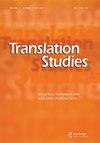Doubly invisible: Anna Larpent, domestic censorship, and the translation of performance cultures in Georgian Britain
IF 2.2
2区 文学
0 LANGUAGE & LINGUISTICS
引用次数: 0
Abstract
ABSTRACT Drawing on censored manuscripts and personal writing, the article uncovers the invisible role played by Anna Larpent, the wife of John Larpent (Royal Theatre Censor 1777–1824), in shaping foreign drama and opera in Georgian Britain. Anna's journals demonstrate that, as a more attentive theatregoer and critic than her husband, she took on many aspects of the role of reviser and curator of the submitted plays and became an important mediator between European performance cultures and Georgian audiences. The article explores the complex and contradictory role played by Larpent as an “agent of translation” selecting and censoring European performance cultures throughout this period and introduces the notion of “domestic censorship” to give visibility to the labour and agency of women. In doing so, it highlights the value of archives of life writing in providing empirical evidence of the wide range of agents involved in shaping the translation of performance cultures.双重隐形:安娜·拉彭特,国内审查制度,以及格鲁吉亚英国表演文化的翻译
本文以经过审查的手稿和个人写作为依据,揭示了约翰·拉彭特(皇家剧院审查员1777-1824)的妻子安娜·拉彭特在塑造格鲁吉亚时期英国的外国戏剧和歌剧方面所起的无形作用。安娜的日记表明,作为一个比她丈夫更细心的戏剧观众和评论家,她承担了提交戏剧的修订和策展人的许多方面的角色,并成为欧洲表演文化和格鲁吉亚观众之间的重要调解人。本文探讨了larent作为“翻译代理人”在这一时期选择和审查欧洲表演文化所扮演的复杂而矛盾的角色,并引入了“国内审查”的概念,以使妇女的劳动和代理可见。在这样做的过程中,它强调了生活写作档案的价值,它为塑造表演文化翻译所涉及的广泛因素提供了经验证据。
本文章由计算机程序翻译,如有差异,请以英文原文为准。
求助全文
约1分钟内获得全文
求助全文

 求助内容:
求助内容: 应助结果提醒方式:
应助结果提醒方式:


